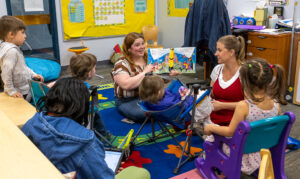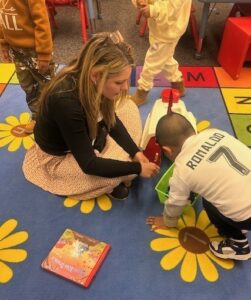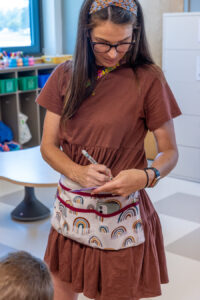Pyramid USA Consultants, Jill M. Waegenaere, M.A., CCC-SLP, and Molly Lingo, M.Ed., BCBA, discuss the important role of the paraprofessional in the classroom.
As Pyramid Educational Consultants we spend a lot of time certifying classrooms in the Pyramid Approach to Education®. During this process we not only certify the classroom teacher, but the entire educational team, including the paraprofessional! However, the paraprofessional voice is often one we don’t hear. One of our challenges as consultants is empowering this critical educational team member in the certification process. We want to share some of the strategies superstar paraprofessionals and classroom teams have found to be useful.
One of the common barriers we see to effective collaboration is a power imbalance amongst staff. For example, some paraprofessionals have shared that they are hesitant to infringe on the classroom teacher and might be reluctant to teach a lesson. We’ve observed some lessons where the expectations for support were unclear leaving the paraprofessionals lost as to how they could best help. Lack of communication and clear responsibilities can lead to challenges with relationships and often negatively impacts overall job satisfaction.


Here are 8 quick tips for breaking down the barriers for a more cohesive classroom environment:
- Define Clear Roles and Responsibilities
Clarify each person’s duties to avoid confusion within lessons and ensure everyone knows how to contribute effectively to classroom goals. One recommendation we’ve often made is to switch roles, for example, the para leads morning circle, and the teacher provides student support. This provides an eye-opening perspective for both roles and gives an opportunity for each team to experience “the other side.” - Open and Regular Communication
Make time to discuss daily plans, student needs, and share feedback. Create a safe space for offering and receiving feedback respectfully. When time doesn’t allow for a formal team meeting, a quick couple minute huddle can be a great way to keep communication flowing amongst team members throughout the school-day. Remember, it’s not about us, it’s about the learners. - Mutual Respect and Professionalism
Acknowledge each other’s expertise and experience. Teachers and paras should see themselves as partners, not as supervisor and assistant. Consider your strengths and what you bring to the team. If you like numbers, perhaps you would be better cut out for collecting data than prepping materials. If you are very timely, then maybe you could be responsible for keeping track of the schedule and order of activities. - Shared Student Observations
Exchange insights about student behaviors, academic progress, and social interactions. Paraprofessionals often have keen insight into each student, especially their skills and struggles. Getting paraprofessionals involved in taking data or notes
- Professional Development Together
We know it’s not always possible but attending training or workshops as a team helps grow skills and build shared language and strategies. Consider proactively reaching out to administration and requesting for the classroom to be trained as a whole early on. As trainers, we love seeing team members attend professional development together, as it leads to better communication and ongoing consistent implementation. - Model and Reinforce Expectations Together
Work together to maintain consistent classroom rules, routines and responses, showing students that both adults are a united force. Don’t be afraid to ask questions and review documents such as IEPs and Behavior Intervention Plans. The beginning of the school year is a great time to initially review the documents and then again as modifications are made throughout the year - Problem-Solve as a Team
To build a more cooperative team, address student challenges or logistical issues together. Be confident in contributing ideas and voicing your opinions. Decide on strategies collaboratively that all team members will implement year. - Celebrate Successes Together Acknowledge wins—big or small—as a team.
Recognition boosts morale and reinforces the value of collaboration! Consider doing preference assessments on each other so you can celebrate in a way that’s meaningful, chocolate, coffee, public praise, lunch!?
Whether you’re brand new to the field or have been doing this for many years, we hope you can put some of the tips to use this school year. At Pyramid, we believe creating a culture where all team members are seen as essential contributors, fosters not only professionalism but also a more supportive and effective learning environment for students.

LEARN MORE:
Written by Jill M. Waegenaere, M.A., CCC-SLP and Molly Lingo, M.Ed., BCBA
© Pyramid Educational Consultants, LLC. 2025
